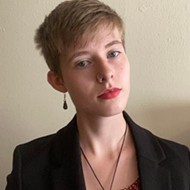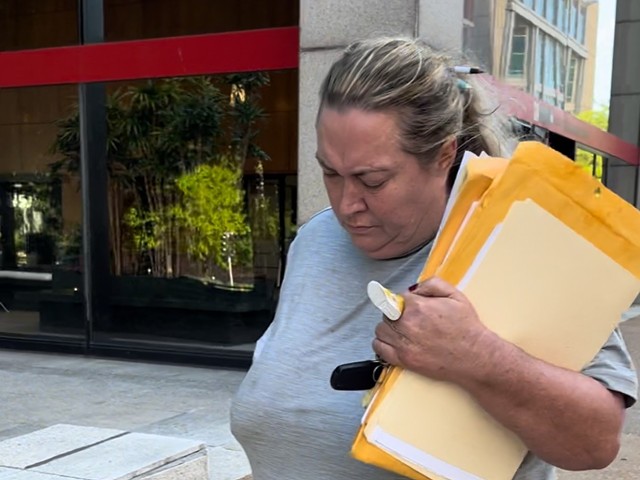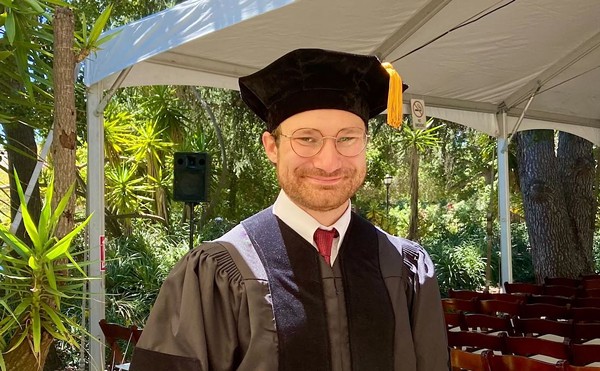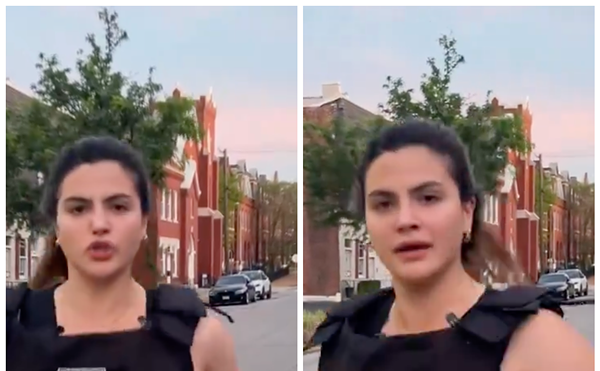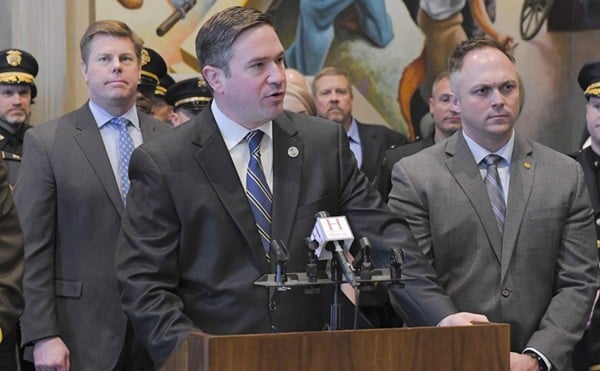Ahead of commencement and in the aftermath of a Pro-Palestine protest and 100 arrests, Washington University says it plans to fence in its campus and increase security.
The fence could be seen being erected around parts of campus this morning.
In an email sent to employees and students, the university says it will change how its Danforth campus can be accessed.
“Access to the east end of campus, including Tisch Park, Brookings Hall and all buildings in the vicinity, will be restricted only to members of the Wash U community. A fence is being installed around the perimeter in order to ensure pedestrian safety and keep the area clear while crews are setting up a stage and other structures associated with the post-Commencement celebration,” the university says in its statement.
Anyone wishing to enter the campus will be required to show a university ID at one of its entrances “until further notice,” the university adds.
The morning after the university sent an announcement of these commencement preparations, Chancellor Andrew Martin sent another email, saying, “This has been a tumultuous time for our Wash U community.”
“Unfortunately, we know it’s not over,” Martin added. “Tensions remain very high within and outside of our campus — here in St. Louis and beyond — as we all continue to grapple with serious, high-stakes world issues. There are no easy solutions.”
The email was also signed by Vice Chancellor for Student Affairs Anna Gonzalez, Executive Vice Chancellor and Chief Administrative Officer Nichol Luoma, and Provost and Executive Vice Chancellor for Academic Affairs Beverly Wendland.
Since Wash U responded to a student-led encampment with police force, more than 1,400 students, alumni, faculty and staff have signed an open letter condemning the university administration.
Martin says in his latest email that what happened on campus on April 27 “was not good for anyone.”
“We share in the heartache of all who are struggling with the steps we felt necessary to keep our campus safe for the vast majority of our community, who follow our policies and share in our commitment to our work and our mission. We would have much preferred that those who were arrested Saturday left voluntarily when authorities told them multiple times to disperse,” Martin writes. “Unfortunately, they made a different choice, which is regrettable for us all.”
A 65-year-old Southern Illinois University Edwardsville Professor, Steve Tamari, was arrested while filming the protest. Police tackled and brutalized him so badly he was hospitalized with multiple broken ribs and a broken hand.
Wash U has a long history of supporting free expression, Martin says. But that free expression “does have its limits.”
Following Wash U’s decision to arrest protestors and bystanders at Saturday’s encampment, the ACLU of Missouri issued a statement condemning the university’s actions. The statement says Wash U’s actions “chills, curtails, and restricts expression despite the university’s claims of commitment to that very principle.”
“We do not allow anyone — particularly individuals who are not directly affiliated with Wash U — to violate our policies, create chaos, instill fear in our community, and prevent us from engaging in our regular educational activities and campus life,” Martin writes. “We stand firm in our resolve to take action when individuals inside or outside of our community do any of those things.”
Martin lists what he says policy deems acceptable and unacceptable forms of protest on campus, saying activities that “disrupt our ability to fulfill our institutional mission” are not acceptable, nor are encampments, blocking entrances or walkways or “threatening or harassing speech directed at an individual or group.” He adds, “Members of the St. Louis community are allowed to be on campus. They are not allowed to come here to disrupt our ability to learn or work, or to do harm to our community.”
“Anyone who is asked to leave by the university or law enforcement must leave or risk disciplinary action or, potentially, arrest,” Martin writes. “This is never our first or preferred choice. We do not want to have to take this step — with anyone, but particularly our own students, faculty, and staff. We are deeply saddened that we have ended up in this position in recent weeks.”
Martin writes that the university is continuing to work through the disciplinary process for the students and staff who were suspended or placed on leave after the protest.
With commencement just over a week away, Martin then proceeds to beg students not to protest the event.
“We all are mindful that the Class of 2024 includes graduating seniors who were deprived of their high school commencement because of the COVID pandemic,” he writes. “This was unfair, disappointing, and a genuine loss to students and their families. We’re hopeful that everyone in the Wash U community will do their part to help ensure that these students in particular are able to have at least one graduation that is memorable for the right reasons.”
Students have promised to continue the protests until Wash U divests from Boeing. That includes an emergency protest for Gaza tonight at 5 p.m. at the corner of Lindell and Skinker in Forest Park.
Follow us: Apple News | Google News | NewsBreak | Reddit | Instagram | Facebook | Twitter | Or sign up for our RSS Feed

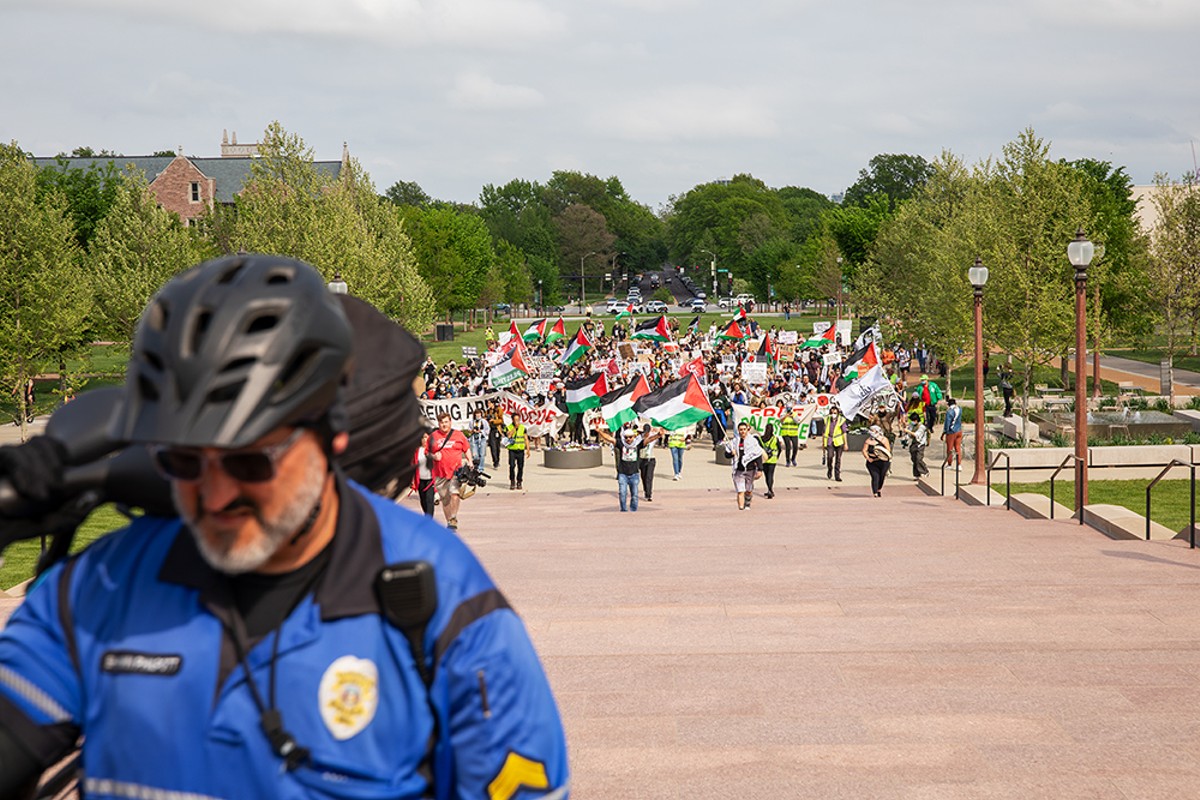
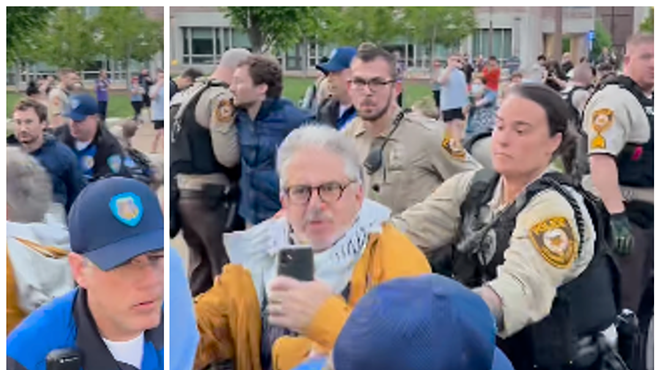
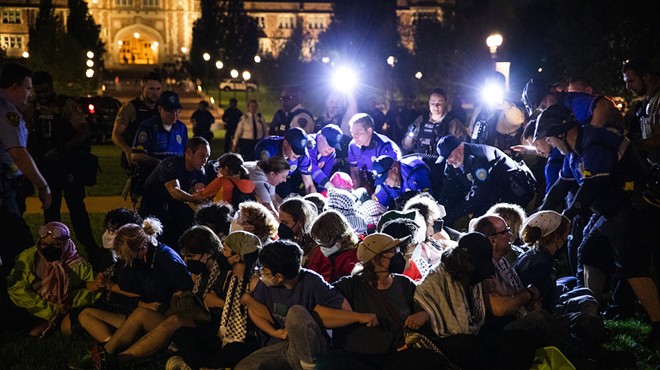
![Wash U Crackdown on Pro-Palestine Protest Results in 80+ Arrests [PHOTOS]](https://media1.riverfronttimes.com/riverfronttimes/imager/wash-u-crackdown-on-pro-palestine-protest-results-in-80-arrests-photos/u/inlineslideshow/42430042/839_washuprotest_042724_zl_53685491970_o.jpg?cb=1714333690)
![Wash U Crackdown on Pro-Palestine Protest Results in 80+ Arrests [PHOTOS]](https://media1.riverfronttimes.com/riverfronttimes/imager/wash-u-crackdown-on-pro-palestine-protest-results-in-80-arrests-photos/u/slideshowthumb/42430021/113_washuprotest_042724_zl_53685404964_o.jpg?cb=1714333340)
![Wash U Crackdown on Pro-Palestine Protest Results in 80+ Arrests [PHOTOS]](https://media1.riverfronttimes.com/riverfronttimes/imager/wash-u-crackdown-on-pro-palestine-protest-results-in-80-arrests-photos/u/slideshowthumb/42430022/138_washuprotest_042724_zl_53685404869_o.jpg?cb=1714333340)
![Wash U Crackdown on Pro-Palestine Protest Results in 80+ Arrests [PHOTOS]](https://media2.riverfronttimes.com/riverfronttimes/imager/wash-u-crackdown-on-pro-palestine-protest-results-in-80-arrests-photos/u/slideshowthumb/42430024/186_washuprotest_042724_zl_53684168817_o.jpg?cb=1714333340)
![Wash U Crackdown on Pro-Palestine Protest Results in 80+ Arrests [PHOTOS]](https://media2.riverfronttimes.com/riverfronttimes/imager/wash-u-crackdown-on-pro-palestine-protest-results-in-80-arrests-photos/u/slideshowthumb/42430025/240_washuprotest_042724_zl_53685035876_o.jpg?cb=1714333340)
![Wash U Crackdown on Pro-Palestine Protest Results in 80+ Arrests [PHOTOS]](https://media1.riverfronttimes.com/riverfronttimes/imager/wash-u-crackdown-on-pro-palestine-protest-results-in-80-arrests-photos/u/slideshowthumb/42430026/266_washuprotest_042724_zl_53685260788_o.jpg?cb=1714333340)
![Wash U Crackdown on Pro-Palestine Protest Results in 80+ Arrests [PHOTOS]](https://media1.riverfronttimes.com/riverfronttimes/imager/wash-u-crackdown-on-pro-palestine-protest-results-in-80-arrests-photos/u/slideshowthumb/42430027/302_washuprotest_042724_zl_53685404809_o.jpg?cb=1714333340)
